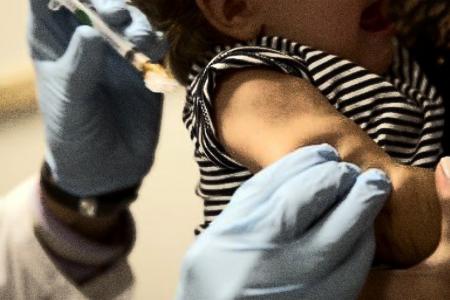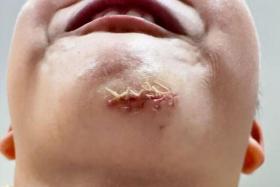Anti-vaxx parents looking at fines
Some don't inoculate their children against measles despite law. Other parents say: 'It's irresponsible and inconsiderate'
If you refuse to vaccinate your child against measles, you may soon be in trouble with the law.
The Health Ministry (MOH) is considering prosecuting non-compliant parents if they cannot be persuaded to protect their children against this highly infectious disease, MOH told The New Paper.
Measles and diphtheria vaccinations are compulsory under the Infectious Diseases Act in Singapore.
Replying to queries from TNP, an MOH spokesman said that under the law, parents who fail or refuse to inoculate their kids will be fined up to $500 for the first offence and up to $1,000 for the second or subsequent offence.
"We work closely with the Health Promotion Board (HPB) to educate the public on the importance of disease prevention through early childhood vaccinations.
"HPB also sends out reminders to parents if there is no record of vaccination," she said.

Yet, there are some parents who do not inoculate their children despite it being mandatory.
MOH, in an earlier press release announcing a spike in the number of measles cases, had called for pre-school children "who have missed one or both doses of measles vaccination, to be vaccinated without delay".
Dr Chan Poh Chong, who heads the division of General Ambulatory Paediatrics and Adolescent Medicine at the National University Hospital, said that as measles and rubella are viral infections that can affect the young - sometimes causing serious complications - it is important that children are vaccinated as soon as they can be.
He said: "Vaccination is the best way to prevent outbreaks, and when outbreaks occur, keeping children affected by measles till they are not infectious would be ideal.
"Giving vaccination even after exposure can prevent or at least reduce the severity and period of infection even if they develop the disease."
Dr Low Kah Tzay, a paediatrician with Mount Elizabeth Hospital, added: "Measles is one of the most contagious viral disease and is said to cause 90 per cent secondary infection in non-immune household contacts.
"There is no effective treatment, only supportive management. Therefore, adults who look after young children should be vaccinated to protect vulnerable children below one year old."
Dr Low said that doctors notify the Health Ministry after administering a dose of vaccine.
"The role of the healthcare provider is to encourage and educate and not be punitive and punish," he said.
Parents TNP spoke to said that those who do not vaccinate their children against measles are selfish and socially irresponsible.
Childcare specialist Serene Chan, 54, said that her daughter, who is a mother, feels strongly about vaccination.
"She is very upset that people can choose not to vaccinate (their children). It affects other people and puts other children at risk. They shouldn't be allowed to choose," said the grandmother of a three-month-old boy.
ANTI-VAXXERS
A mother who sends her twins, aged four, to a kindergarten where there are children of other nationalities, said: "There are a few children at the school whose parents are anti-vaxxers (people who are anti-vaccines).
"They believe that vaccines cause autism in children and that children fare better if they develop antibodies for diseases naturally. Their kids are not vaccinated and it is worrying."
Ms Liew Hanqing, 34, who runs a writing consultancy, said: "It is irresponsible and inconsiderate to forget to vaccinate your children. There is really no excuse for it. Even if you were to forget, HPB will send you reminders to do so."
The mother of three - two boys, aged six and four, and an eight-month-old girl - said she is "not so concerned about my older kids passing to her because both boys are up to date with their MMR (measles, mumps and rubella) vaccinations".
"But I will minimise taking her out to places where there are a lot of older kids," she said.
Mrs Christine Hoe, 37, has also decided to minimise her 11-month-old daughter's time in crowded places "until next month when she gets her MMR vaccine".
"I am not only protecting her, it is also my social responsibility," she said.
Vaccination is the best way to prevent outbreaks, and when outbreaks occur, keeping children affected by measles till they are not infectious would be ideal. Giving vaccination even after exposure can prevent or at least reduce the severity and period of infection even if they develop the disease.
- Dr Chan Poh Chong
Measles: Symptoms and complications
Measles is a childhood infection caused by a virus.
It can be prevented with a vaccine.
Signs and symptoms of measles include fever, cough, runny nose, sore throat, conjunctivitis and a rash that spreads from the head downwards.
Measles can be serious and even fatal for children younger than five and adults older than 20.
Complications from the disease include ear infection, pneumonia (lung inflammation) and meningitis (inflammation of the lining of the brain and spinal cord)
DEATH RATE
The death rate can be 1 in 1,000 population.
The vaccine against measles, mumps and rubella, called MMR vaccine, is a live attenuated vaccine, which means it is weakened so as not to cause illness, yet is able to elicit an immune response in the body.
When two doses of the MMR vaccines are given, it has a very good efficacy of 97 per cent protection and will cover the individual for life.
As long as two doses are given, there is no need for re-vaccination.
Some children still get measles in spite of vaccinations because they are somehow unable to produce antibodies for protection, and this is the reason a second dose is required to help the 2 to 5 per cent of the population who do not seroconvert (produce antibodies) after the first dose.
Source: Mayo Clinic; Dr Chan Poh Chong, head, division of General Ambulatory Paediatrics and Adolescent Medicine, National University Hospital
Measles cases nearly tripled
The number of measles cases in Singapore nearly tripled in the first 20 weeks of this year, compared to the same period last year.
The Ministry of Health (MOH) said on Thursday that as of last Saturday, 50 cases of measles have been reported.
This was 33 more than the 17 cases reported in the same period last year.
Of this year's reported cases, 40 involved Singaporean patients and 34 of these were children, said MOH.
Half of the local children were babies under the age of one, who were not due for the measles, mumps and rubella (MMR) vaccination.
Fourteen children were aged between one and six and had missed their MMR vaccination. Three were a year old and had received only one dose of the MMR vaccination.
The MMR vaccination is available at polyclinics, private GP clinics and private paediatric clinics. It is fully subsidised for Singapore citizens at polyclinics. Medisave can be used at private GP and paediatric clinics.
Get The New Paper on your phone with the free TNP app. Download from the Apple App Store or Google Play Store now


